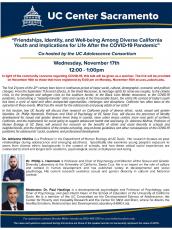Friendships, Identity, and Well-being Among Diverse California Youth and Implications for Life After the COVID-19 Pandemic
Presented by the UC Consortium for the Developmental Science of Adolescence and the UC Center Sacramento
Professor Phillip Hammack from UC Santa Cruz and Professor Adrienne Nishina from UC Davis, Moderated by Paul Hastings from UC Davis
The first 21 years of the 21st century have been a continuous period of major social, cultural, demographic, economic and political changes. From the September 11 terrorist attacks, to the Great Recession, to marriage rights for same-sex couples, to the climate crisis, to the immigrant and refugee crisis on the southern border, to the Black Lives Matter movement, to the COVID-19 pandemic, to becoming a “majority-minority” state and country in the foreseeable future, the entire life context of today’s youth has been a cycle of rapid and often unexpected opportunities, challenges and disruptions. California has often been at the epicenter of these events. What has this meant for the adolescents and young adults of our state?
In this session, two UC faculty will discuss their research on California youth of diverse ethnic, racial, sexual and gender identities. Dr. Phillip Hammack, Professor and Chair of Psychology at UC Santa Cruz, will discuss the processes of identity development for sexual and gender diverse teens living in coastal, more urban versus central, more rural parts of northern California, and the implications for social policy to support adolescent health and well-being. Dr. Adrienne Nishina, Professor of Human Ecology at UC Davis, will present her research on the benefits of ethnic and racial diversity in schools and neighborhoods, and the implications of the remote-schooling, stay-at-home guidelines and other consequences of the COVID-19 pandemic for adolescents’ social, academic and professional development.









